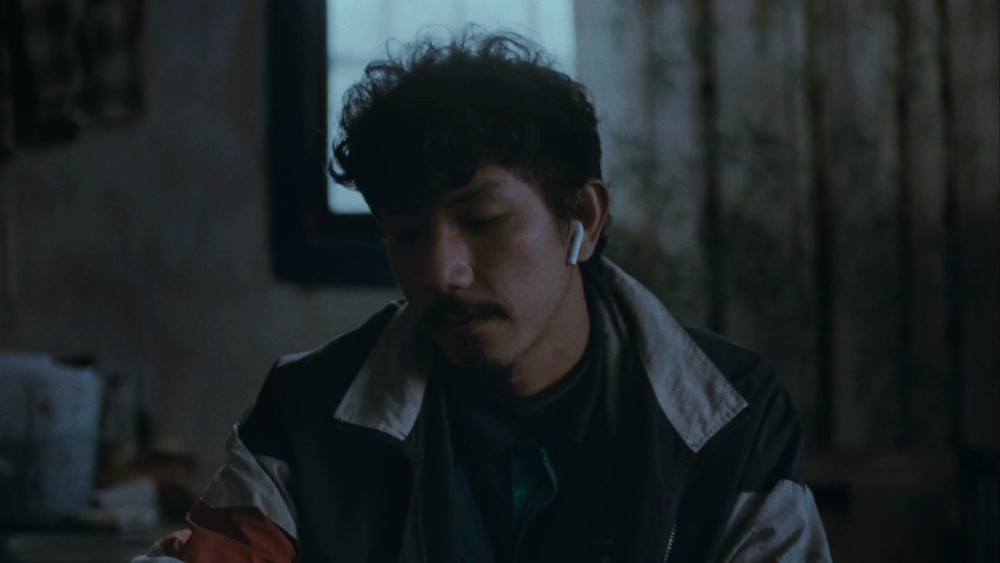There’s a serene, still devastation lurking at the heart of Chiang Wei Liang’s “Mongrel.” This is a film that works by way of spare gestures. Its silences, simmering through frequently long, measured takes, are potent with melancholy and resignation. Dounia Sichov’s editing develops a gentle, solid rhythm. Yet, Liang infuses the sadness with a certain wispy grace. Characters in the film are trudging through hopeless situations. They seek to extricate themselves from their misery, but the door to a better, happier time seems shut. As a result, the film embeds itself in a grief that constantly bobs on the surface.
Right from the opening sequence, Chiang instructs us how to modulate our viewing temper, which helps ease us into the film’s air of meditative stupor. Perhaps a stupor would be inaccurate since the film quietly simmers with a thrust towards a kind of regenerative action, which characters may be failing at; nevertheless, the strife cannot be negated. Set in a Taiwanese province, “Mongrel” circles a community of illegal migrant workers, a disparate bunch from Vietnam, the Philippines, Thailand, and Indonesia. They have all arrived in the pursuit of better-paying jobs than what they’d get back home. However, exploitation ensures things aren’t so pretty.
The film is pivoted around Oom (Wanlop Rungkumjad), a Thai migrant, one among the community whose livelihood depends on the underhand dealings of ‘Boss’ Hsing (Hong Yu-hong). Hsing makes them do all sorts of odd jobs. However, there have been stirrings of deep unrest among the workers, who haven’t been paid for two months. They need to send money home to their parents and children. Hsing reassures them he will pay them soon but pleads for some patience. He insists he’s hard-pressed in finances, requesting for a bit more time. He doesn’t stipulate any time frame, though, in which he will be able to remunerate them.
Oom is a kind of fixer for Hsing, a go-between representative of the workers. It seems like he’s the right-hand man of the boss, though he barely wields any actual power or agency. Both sides, the workers and the boss make it abundantly clear how reliant they are on Oom to defend their best interests. That Oom had also assured the workers they could trust him and he would look after them only stiffens the expectations bundled on him to smoothen out any dire straits. On the other hand, Hsing doles out small gifts to Oom to keep his loyalty inclined towards him. He calls on Oom to keep the workers in line and be ready to do his bidding. The imminent conflict would generate intensely dramatic confrontations if this were a regular film.

Instead, “Mongrel” mostly adopts a subdued tone. Fitful, anguished outbursts occur only in the smallest pockets. Disaffection and helplessness otherwise saturate the holistic mood of the film. Oom works as a caregiver to an infirm woman, Mei (Lu Yi-Ching), her disabled son, Hui (Kuo Shu-wei), and another old woman. Oom is a caregiver with a remarkably tender, generous touch. The nonverbal relationship between Oom and Hui engenders scenes of startling delicacy and intimacy.
The care Oom demonstrates and extends has a kindness borne of exceptional thoughtfulness. These aren’t just patients for Oom but rather occupy him with an emotionally invested space and regard. Much to his boss’s disliking, he slips deeper into the lives of the mother and son. The scenes between Oom, Mei, and Hui constitute some of the film’s most crushingly poignant moments, evoking a string of tough, heartbreaking decisions and building to a slew of moments so bare and vulnerable it can rip your heart out.
The sections revolving around Oom’s palliative care are girdled by a larger vision of absolute precarity. While the film deliberately eschews any backstories or personal connections of the characters to buttress empathy, it thrives in constructing a bunch of brilliant, revealing individual moments. Standalone sequences are endowed with largesse of stories, hinting at fates that are reiterated every time hordes of migrants burst out the airport doors, immediately redirected and picked up by agents seeking to recruit them. This comes alive in one of the film’s most memorable scenes that jolts the viewer.
Amidst this flash of the pickup operation, government officials only meekly register resistance, stating the people have come for tourism, not work. The workers already lodged in the dormitory provided by Hsing have their IDs in his grip so they cannot easily leave even if they wish. Disappointed in Oom, they ask him if he owes the boss; therefore, he is being so passive and tends to coax them into submitting to the boss’s appeal instead of protesting. “Mongrel” delineates a snaky, circuitous power hierarchy that cuts several rungs above the workers’ boss, wherein he is also in the lurch. The power of the film is in its compassion, which is overwhelmingly powerful in its quietude and restraint.








